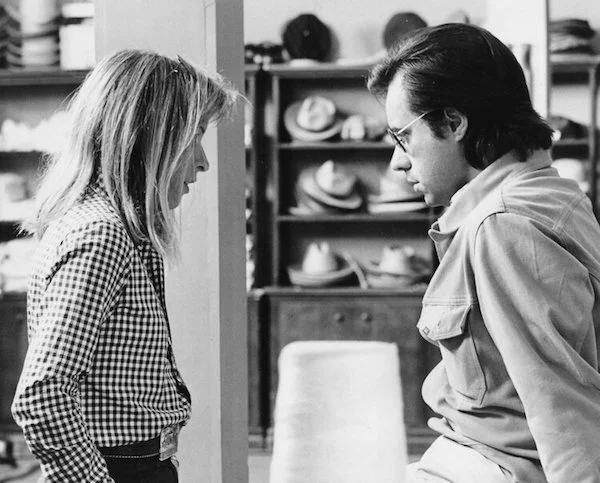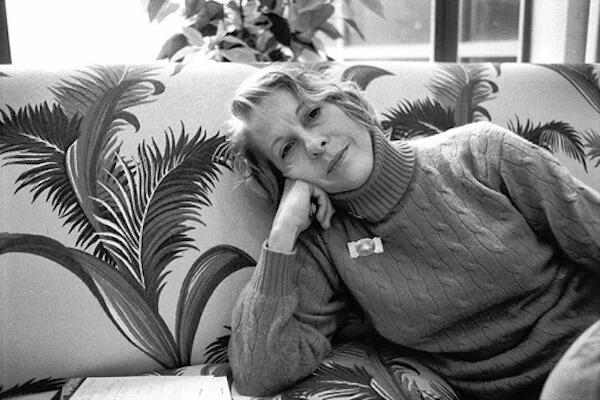You know Polly Platt’s work, even if you’ve never heard of her before.
Over the course of her decades-long career as a film producer, screenwriter, and production designer, Polly Platt was the driving creative force behind films such as Terms of Endearment, Pretty Baby, and Broadcast News. For the ubiquity and acclaim of Platt’s films, she’s a largely forgotten figure in the Hollywood landscape of the 70s and 80s––until now. The new season of Karina Longworth’s wildly successful podcast You Must Remember This follows Platt’s life and career, including her triumphs in the industry and her tumultuous professional and personal relationships with icons such as Peter Bogdanovich, whose collaboration produced the landmark New Hollywood films The Last Picture Show and Paper Moon.
This season of You Must Remember This guides us through Platt’s life with wit and empathy, humanizing Hollywood’s underdogs and titans in equal measure. A film historian and writer by trade, Longworth uses interviews, research, and the framework of Platt’s incomplete and unpublished memoirs to tell the story of a Hollywood trailblazer in a smart and endlessly addictive way. In this interview, I talk to Longworth about the new season, Platt’s cultural footprint, and the ways that Hollywood history reflects our present moment.
Many describe You Must Remember This as an “alternative” history of Hollywood. But it’s not really because the stories you tell are hidden in plain sight––more like, as you say in the podcast’s introduction, forgotten histories. Is there something rewarding about centering this podcast around the unsung heroes of Hollywood?
You’re right that it’s not alternative history. The way I’ve described the “secret and/or forgotten histories” idea is that a lot of these stories are forgotten –– even when it comes to Marilyn Monroe, who everybody thinks they know everything about –– you don’t know the nuances. When it comes to the “secret history” aspect, that is a way of talking about how we reframe the past through the way we live now, and through the way we see the work now. Even just the act of taking Polly Platt seriously is telling a secret history.
It seems like there is a lot of alternative––or just speculative––historical content coming out of Hollywood right now.
You mean, like, the Ryan Murphy show?
Yes, it’s also impossible to think about Quentin Tarantino’s Once Upon a Time… in Hollywood without thinking about your Charles Manson season of You Must Remember This. What are your feelings on these actual alternative or speculative histories of Hollywood, and do you see those as being in conversation with your own work?
I definitely think it’s in conversation. I think I understand the impulse behind Once Upon a Time… In Hollywood more than I enjoy the movie. To me, the impulse stems from this idea that something like the Manson Murders becomes collective history, and so everybody has their own fantasy response to it – this is Tarantino’s. There’s something absolutely fascinating about that.
I could have done without the last half hour of that movie, because what was really fascinating was the relationship between the two guys. So then, when it becomes wish fulfilment, it’s less interesting. In terms of something like Ryan Murphy’s show, whether you like it or not, he’s also trying wish fulfilment, and there’s something optimistic about that. In both cases, this optimism is interesting when created by those specific auteurs. What I hope is that people are able to watch with a certain kind of media criticism and perspective.
I’ve always really admired the way You Must Remember This approaches the stories with such clarity and empathy––you really treat film and cultural history with a level of seriousness that isn’t always present in more sensationalized Hollywood histories. Is this a way that you separate You Must Remember This from other books and podcasts?
It goes back to the way I’ve always approached these things, which is that being interested in the history of Hollywood has always been a part of my life. It didn’t occur to me that it was a strange or niche subject until I moved to Chicago when I was 18. It’s something I’ve always taken seriously.
I’ve been able to empathize with a lot of my subjects, who were having experiences a lot of us have in terms of feeling inadequate, dealing with substance abuse and grief, and struggling to just get to the top of your profession and then feeling, “Is that all there is?” These are human experiences; it just so happens that they are happening within the creation of a visual culture that was the dominant force of the 20th century.
The subjects you cover are so reflective of a wider cultural history, so there’s a lot to gain.
Nothing happens in a vacuum. These people who are making movies are humans living in the world in their specific time. What I’m always trying to do is tap into what it would feel like to be that person living at that moment and that place.
Why did you choose to focus on Polly Platt for this season?
She kind of chose me. I’ve always been fascinated by her story and wanted to learn more about it, and then through a friend of a friend I got access to her unpublished, unfinished memoir and my first impulse was to try and publish it as a book. I got a lot of doors shut in my face because the literary industry basically was like, “We’ve never heard of this lady.” So, it's sort of a chicken versus the egg thing of “Well, you haven’t heard about her because no one’s written a book about her. How are you going to hear about her if you don't let me write a book about her?” But with the podcast, I have free reign to do whatever I want, and so it just became really clear that I could tell her story pretty fully in this format.
I want to talk a little bit more about Polly’s unfinished memoir and the interviews you did for this podcast. What did the research process end up looking like?
It was a few different things. It was getting to know Polly and Peter Bogdanovich’s daughters, Soshy and Antonia, and it was through them, connecting to people in Polly’s life who were still around and could fill in the gaps in the unfinished memoir. It’s the usual process I do when writing a book, a little less so on the podcast, of doing archival research and looking for primary documents and just kind of trying to read all available resources to help me understand things. I was very lucky that the Academy’s Margaret Herrick Library recently started cataloguing James L. Brooks’ papers, which were super helpful for Polly’s career in the 80s and 90s, and just being able to use their files was great.
The American Film Institute allowed us access to seminars that Polly gave in the late 70s and 80s, and we were able to use excerpts of these lectures in the podcast, which was really helpful. I then worked with Barbara Hall at the Art Directors’ Guild, which is relevant to [Episode 2] in which I do this little breakdown of how the Art Directors’ Guild systematically tried to exclude Polly, and how she wore them down.
I just finished listening to that episode, and had no idea how much of a hard-to-get-into association that was and the role [the guild] played in Polly’s life.
I’ve singled out the Art Directors’ Guild because it’s what Polly had experienced, but all the cinema unions at that time were not used to women wanting to be involved. With maybe the exception of costume design and screenwriting, there weren’t a lot of women working behind the scenes on movies. Crews were very, very male, until as late as 1971, so it wasn’t standard for a woman to apply to these unions. In the documentation, it’s clearly apparent that they weren’t taking Polly seriously because of her gender.
In past seasons you've focused more on celebrities with an established visual presence in our culture. Since most of Polly’s work was behind-the-scenes, were there any challenges in ensuring you accurately portrayed her achievements in film that viewers might not pick up on?
I was lucky to have her memoir as a guide, because one of the things she does in her writing is approach every film she’s worked on by describing her role, and she has a dry, self-deprecating way of talking where she will absolutely take credit for her own ideas, while at the same time being like “Everybody hated me because I wouldn’t stop talking,” and “I was torturing the director because I had all these ideas,” and “I insisted on changing the location [of filming] and then everybody was mad at me.” Everybody might have been mad at her, but she was making movies better.
You talk a lot in this season about auteur theory in Hollywood, which is an inescapable topic this season with Peter Bogdanovich and Orson Welles. How did you balance Polly’s story with these [auteur directors], who I imagine could really overpower the dynamic that you’re setting up in the podcast?
The only reason those people come into it is because she wrote them into her memoir. Especially with Orson Welles and John Ford, those were people whose movies she was as obsessed with as Peter was, and she was right there when he was getting to know them. So she had great stories about them. How do you not include anecdotes about Orson Welles and John Ford? I didn’t really even see it as a balancing act because these are Polly’s experiences.
If we fast-forward a few decades after Polly worked with Bogdanovich, we get to James L. Brooks. Did you notice any real differences between those collaborations with Brooks that she did later in her life and the earlier collaborations? Other than, of course, the obvious personal entanglements.
Obviously it was different because she was never in a romantic relationship with Brooks, but there are people on the podcast who saw them working together and describe it as being like a marriage. They were as close as two people who were not in a marriage could be. To some extent her whole professional way of being was cast by her experiences with Peter. Everyone she worked with after that, she was comparing to Peter. She was in some sense not necessarily trying to recapture the love that she had lost, but she was trying to recapture this professional collaboration that had been the most satisfying thing she had ever experienced. She had so much success after Peter, was really proud of her movies, but because she was always comparing everything to what she idealized about their working relationship, I think she was always a little dissatisfied.
Even after the dissolution of their marriage, they seemed to have a really good and balanced working relationship between them. Peter seemed to really value her opinion.
That’s what she came to realize after she started working with other directors. As painful as it could be to work with this man that had romantically humiliated her, he took her seriously as an artist in a way that she had to fight for with everybody else.
Madeleine Seidel (@mhllndrivethru) is a freelance arts writer and curator based in Brooklyn with bylines at The Brooklyn Rail, Little White Lies, and BURNAWAY. She is a current Masters candidate at Hunter College and has previously worked at the Whitney Museum of American Art. Her current research interests include American feminist art movements in the 20th century, curatorial practices in film exhibition, and the art of the American South, especially art from her home state of Alabama.



